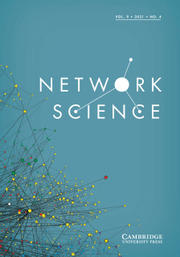Article contents
Social network change after moving into permanent supportive housing: Who stays and who goes?
Published online by Cambridge University Press: 13 July 2020
Abstract
Social relationships are important among persons experiencing homelessness, but there is little research on changes in social networks among persons moving into permanent supportive housing (PSH). Using data collected as part of a longitudinal study of 405 adults (aged 39+) moving into PSH, this study describes network upheaval during this critical time of transition. Interviews conducted prior to and after three months of living in PSH assessed individual-level (demographics, homelessness history, health, and mental health) and social network characteristics, including network size and composition (demographics, relationship type, and social support). Interviewers utilized network member characteristics to assess whether network members were new or sustained between baseline and three months post-housing. Multilevel logistic regression models assessed characteristics of network members associated with being newly gained or persisting in networks three months after PSH move-in. Results show only one-third of social networks were retained during the transition to PSH, and veterans, African Americans, and other racial/ethnic minorities, and those living in scattered site housing, were more likely to experience network disruption. Relatives, romantic partners, and service providers were most likely to be retained after move-in. Some network change was moderated by tie strength, including the retention of street-met persons. Implications are discussed.
Information
- Type
- Research Article
- Information
- Copyright
- © The Author(s), 2020. Published by Cambridge University Press
Footnotes
Action Editor: Thomas Valente
References
- 9
- Cited by

